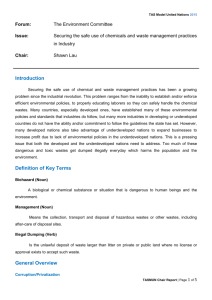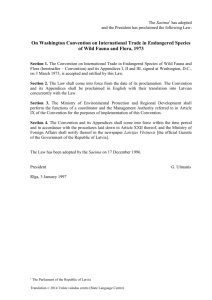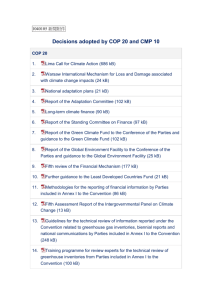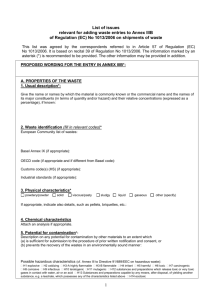Classification of Used Devices
advertisement
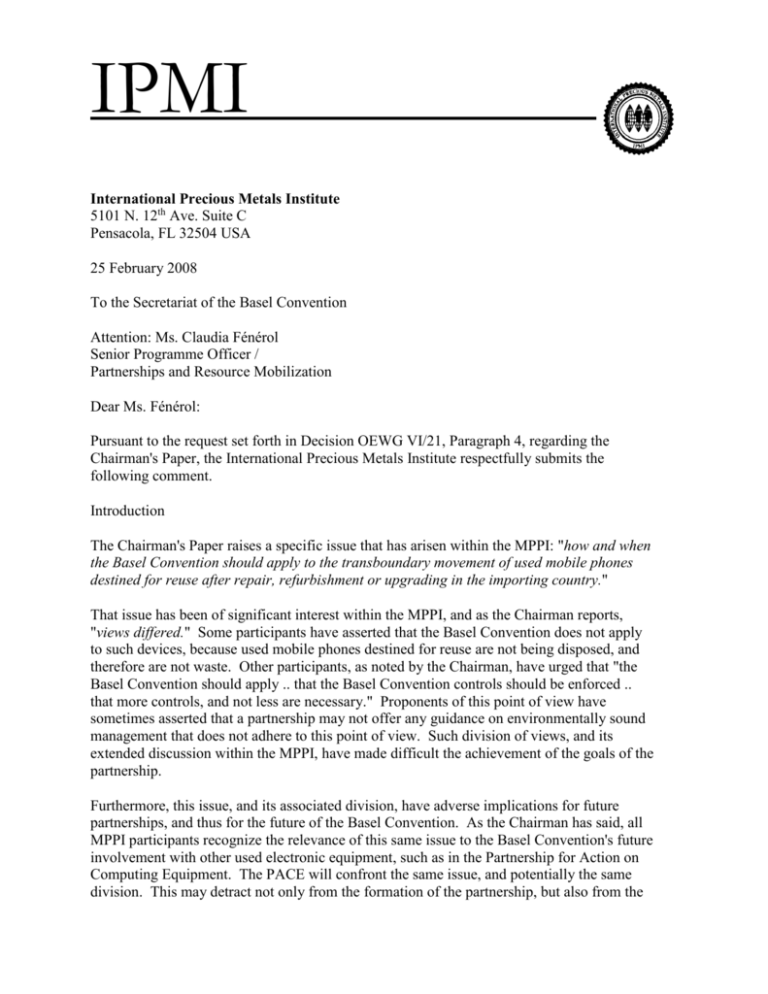
IPMI International Precious Metals Institute 5101 N. 12th Ave. Suite C Pensacola, FL 32504 USA 25 February 2008 To the Secretariat of the Basel Convention Attention: Ms. Claudia Fénérol Senior Programme Officer / Partnerships and Resource Mobilization Dear Ms. Fénérol: Pursuant to the request set forth in Decision OEWG VI/21, Paragraph 4, regarding the Chairman's Paper, the International Precious Metals Institute respectfully submits the following comment. Introduction The Chairman's Paper raises a specific issue that has arisen within the MPPI: "how and when the Basel Convention should apply to the transboundary movement of used mobile phones destined for reuse after repair, refurbishment or upgrading in the importing country." That issue has been of significant interest within the MPPI, and as the Chairman reports, "views differed." Some participants have asserted that the Basel Convention does not apply to such devices, because used mobile phones destined for reuse are not being disposed, and therefore are not waste. Other participants, as noted by the Chairman, have urged that "the Basel Convention should apply .. that the Basel Convention controls should be enforced .. that more controls, and not less are necessary." Proponents of this point of view have sometimes asserted that a partnership may not offer any guidance on environmentally sound management that does not adhere to this point of view. Such division of views, and its extended discussion within the MPPI, have made difficult the achievement of the goals of the partnership. Furthermore, this issue, and its associated division, have adverse implications for future partnerships, and thus for the future of the Basel Convention. As the Chairman has said, all MPPI participants recognize the relevance of this same issue to the Basel Convention's future involvement with other used electronic equipment, such as in the Partnership for Action on Computing Equipment. The PACE will confront the same issue, and potentially the same division. This may detract not only from the formation of the partnership, but also from the environmental goals that it will seek to advance, and from the creation of "innovative solutions through the Basel Convention for the environmentally sound management of electronic wastes." But such adverse consequences should not occur. A legal analysis, set forth below, concludes that the Basel Convention is not applicable to used mobile phones that are, as the Chairman describes, destined for reuse. The same analysis is applicable to the scope of the Convention in regard to used personal computers. Legal Analysis Interpretation of the Basel Convention is governed by the Vienna Convention on the Law of Treaties, Section 3 - Interpretation of Treaties – Articles 31-33. The primary method of interpretation is expressed in Article 31(1): A treaty shall be interpreted in good faith in accordance with the ordinary meaning to be given to the terms of the treaty in their context and in the light of its object and purpose. The primary basis for interpretation of the scope of the Basel Convention is therefore the terms of the Convention itself, and those terms are to be given their ordinary meaning. The terms of the Basel Convention address its scope in a four step process. The first step is recognition that the Convention encompasses only substances and objects that are waste: The following wastes that are subject to transboundary movement shall be "hazardous wastes" for the purposes of this Convention: (a) Wastes that belong to any category contained in Annex I, unless they do not possess any of the characteristics contained in Annex III; and (b) Wastes that are not covered under paragraph (a) but are defined as, or are considered to be, hazardous wastes by the domestic legislation of the Party of export, import or transit. (Article 1(1), emphasis added) Therefore, if a substance or object is not a waste, it is not within the scope of the Basel Convention. The second step, therefore, is examination of the Basel Convention's definition of waste: "Wastes" are substances or objects which are disposed of or are intended to be disposed of or are required to be disposed of by the provisions of national law." (Article 2, Definitions, Paragraph 1, emphasis added) Therefore a substance or object is a waste only if it is disposed, intended to be disposed, or required to be disposed. 2 The third step, therefore, is examination of the Basel Convention's definition of disposal: "Disposal" means any operation specified in Annex IV to this Convention" (Article 2, Definitions, Paragraph 4) Therefore a substance or object is a waste if, and only if, it is destined for an operation that has been specified by the Basel Convention in Annex IV. The fourth step, therefore, is examination of the operations specified in Annex IV. Annex IV has two parts, IVA and IVB. Annex IVA specifies "Operations Which Do Not Lead to the Possibility of Resource Recovery, Recycling, Reclamation, Direct Re-Use or Alternative Uses. Section A encompasses all such disposal operations which occur in practice. D1 Deposit into or onto land, (e.g., landfill, etc.) D2 Land treatment, (e.g., biodegradation of liquid or sludgy discards in soils, etc.) D3 Deep injection, (e.g., injection of pumpable discards into wells, salt domes of naturally occurring repositories, etc.) D4 Surface impoundment, (e.g., placement of liquid or sludge discards into pits, ponds or lagoons, etc.) D5 Specially engineered landfill, (e.g., placement into lined discrete cells which are capped and isolated from one another and the environment, etc.) D6 Release into a water body except seas/oceans D7 Release into seas/oceans including sea-bed insertion D8 Biological treatment not specified elsewhere in this Annex which results in final compounds or mixtures which are discarded by means of any of the operations in Section A D9 Physico chemical treatment not specified elsewhere in this Annex which results in final compounds or mixtures which are discarded by means of any of the operations in Section A, (e.g., evaporation, drying, calcination, neutralization, precipitation, etc.) D10 Incineration on land D11 Incineration at sea D12 Permanent storage (e.g., emplacement of containers in a mine, etc.) D13 Blending or mixing prior to submission to any of the operations in Section A D14 Repackaging prior to submission to any of the operations in Section A D15 Storage pending any of the operations in Section A" Reuse, repair, refurbishment and upgrading of used mobile phones are not operations specified in Annex IVA. Annex IVB specifies "Operations Which May Lead to Resource Recovery, Recycling, Reclamation, Direct Re-Use or Alternative Uses. Section B encompasses all such operations with respect to materials legally defined as or considered to be hazardous wastes and which otherwise would have been destined for operations included in Section A R1 Use as a fuel (other than in direct incineration) or other means to generate energy R2 Solvent reclamation/regeneration 3 R3 Recycling/reclamation of organic substances which are not used as solvents R4 Recycling/reclamation of metals and metal compounds R5 Recycling/reclamation of other inorganic materials R6 Regeneration of acids or bases R7 Recovery of components used for pollution abatement R8 Recovery of components from catalysts R9 Used oil re-refining or other reuses of previously used oil R10 Land treatment resulting in benefit to agriculture or ecological improvement R11 Uses of residual materials obtained from any of the operations numbered R1-R10 R12 Exchange of wastes for submission to any of the operations numbered R1-R11 R13 Accumulation of material intended for any operation in Section B" Reuse, repair, refurbishment and upgrading of used mobile phones are not operations specified in Annex IVB. The title of Annex IVB does contain the descriptive words: "Operations Which May Lead to ... Direct Re-Use." But that title does not itself specify any operation. The only place in which the Basel Convention specifies disposal operations is in the lists themselves. And those lists are exclusive; they contain no terms such as 'for example,' 'among others' or 'including but not limited to.' It is also important to note that when the Basel Convention does intend that a certain type of operation that leads to reuse should be classified as a type of disposal, it has specified it as such in the list, e.g., "R2 Solvent reclamation/regeneration," an operation that leads to direct reuse of solvent, and R4 Recycling of metals and metal compounds," an operation that leads to direct reuse of metals. The Basel Convention has not, however, specified any operation that may lead to the direct reuse of electronic equipment. Therefore, because repair and refurbishment of electronic equipment are not specified disposal operations in Annex IV, such electronic equipment is not waste when it is destined for reuse after repair, refurbishment or upgrading, and it is not within the scope of the Basel Convention. Conclusion This comment does not suggest that a country may not, or should not, prohibit trade in used mobile phones or used personal computers intended for repair and refurbishment. Trade in used goods has environmental as well as economic aspects, and may require controls. This comment suggests instead that the Basel Convention does not legally bind any country in this respect. The Basel Convention may, of course, elect to amend its terms to encompass such devices, and every country may enact appropriate provisions in national law. The Basel Convention may best assist the parties through appropriate guidance in this respect. Nor does this comment suggest that the Basel Convention abandon its partnerships regarding used mobile phones and used personal computers. The intent of this comment is the opposite – to expand the scope of the partnerships beyond the narrow legal confines of the Basel Convention, to deal with the multifaceted economic and social issues as well as environmental issues associated with used electronic equipment, and to seek innovative 4 solutions. The Basel Convention might seek partnership with UNCTAD, which has recently issued an Information Economy Report 2007-2008, saying that "Mobile phones, being the main communication tool for many entrepreneurs (particularly small entrepreneurs) in developing countries, have great potential for small and medium-sized businesses in those countries." (Report, p.7) The Convention might seek partnership with the ILO, which studies the informal economies of developing countries, in which used mobile phones and used electronic equipment are being imported, repaired, refurbished and reused. The Convention might seek partnership with the WTO, which is considering this issue, and which has recently affirmed the right of a country to impose barriers against the import of retreaded tyres because of environmental consequences. (Brazil - Measures Affecting Imports of Retreaded Tyres - AB-2007-4 - Report of the Appellate Body). In any case, for the time being, the Basel Convention should proceed with its partnerships without imposing inapplicable legal restrictions. Respectfully Submitted, International Precious Metals Institute John Bullock 5
